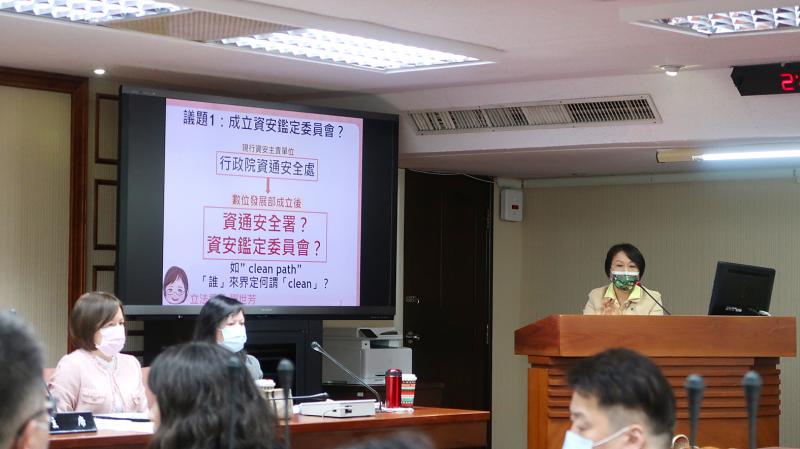Experts on Monday recommended the drafting of a digital development act or basic information act, and urged the Ministry of Education to have universities establish information security departments or schools.
At a public hearing at the Legislative Yuan on the function and resource use of a planned ministry of digital development, National Sun Yat-sen University vice president Huang I-yu (黃義佑) said that he supports the government’s decision to establish the ministry.
Taiwan should follow Israel’s example and invest about NT$500 million (US$17.54 million) to attract talent to its cybersecurity sector, 20 percent of which should be subsidies to local firms, Huang said.

Photo: Chen Yu-fu, Taipei Times
The Ministry of Education should encourage universities to set up departments of cybersecurity, Huang said, adding that the information security sector should not be concentrated in northern Taiwan.
The government must draft a special law, geared toward developing the nation’s digital capabilities, with a commission that can spur digital innovation, not just oversee digital affairs, said Chien Chung-liang (錢宗良), a physician in National Taiwan University’s College of Medicine.
The government, by outsourcing too many projects, risks becoming out of touch with technological advancements, said Chen Chuan-hsi (陳泉錫), a former director of the Ministry of Finance’s Financial Data Center, adding that officials also lack effective measures to supervise the development, quality and security of new software.
The government should collaborate with white-hat hackers distributed among its agencies and conduct routine drills to help officials respond to attacks, he said.
A digital development agency needs to communicate across departments, and be capable of integrating existing information systems or innovating new ones, Chen said.
Chunghwa Telecom cybersecurity director Ma Hung-tsan (馬宏燦) said that the government should encourage entrepreneurship in cybersecurity by setting up a fund.
The government could help lay the foundation for cybersecurity at small and medium-sized enterprises, as they lack the means to defend themselves, Ma said.
Before establishing a ministry, the government should decide on its vision for digital development: whether it would regulate via legislation, as in Europe, or have firms self-regulate, as in Silicon Valley, TEDxTaipei founder Jason Hsu (許毓仁) said.
An agency in charge of digital innovation should not “absorb” talent from other agencies, Hsu said, adding that knowing how to use digitization as a management tool is key.

Taiwan has received more than US$70 million in royalties as of the end of last year from developing the F-16V jet as countries worldwide purchase or upgrade to this popular model, government and military officials said on Saturday. Taiwan funded the development of the F-16V jet and ended up the sole investor as other countries withdrew from the program. Now the F-16V is increasingly popular and countries must pay Taiwan a percentage in royalties when they purchase new F-16V aircraft or upgrade older F-16 models. The next five years are expected to be the peak for these royalties, with Taiwan potentially earning

STAY IN YOUR LANE: As the US and Israel attack Iran, the ministry has warned China not to overstep by including Taiwanese citizens in its evacuation orders The Ministry of Foreign Affairs (MOFA) yesterday rebuked a statement by China’s embassy in Israel that it would evacuate Taiwanese holders of Chinese travel documents from Israel amid the latter’s escalating conflict with Iran. Tensions have risen across the Middle East in the wake of US and Israeli airstrikes on Iran beginning Saturday. China subsequently issued an evacuation notice for its citizens. In a news release, the Chinese embassy in Israel said holders of “Taiwan compatriot permits (台胞證)” issued to Taiwanese nationals by Chinese authorities for travel to China — could register for evacuation to Egypt. In Taipei, the ministry yesterday said Taiwan

Taiwan is awaiting official notification from the US regarding the status of the Agreement on Reciprocal Trade (ART) after the US Supreme Court ruled US President Donald Trump's global tariffs unconstitutional. Speaking to reporters before a legislative hearing today, Premier Cho Jung-tai (卓榮泰) said that Taiwan's negotiation team remains focused on ensuring that the bilateral trade deal remains intact despite the legal challenge to Trump's tariff policy. "The US has pledged to notify its trade partners once the subsequent administrative and legal processes are finalized, and that certainly includes Taiwan," Cho said when asked about opposition parties’ doubts that the ART was

If China chose to invade Taiwan tomorrow, it would only have to sever three undersea fiber-optic cable clusters to cause a data blackout, Jason Hsu (許毓仁), a senior fellow at the Hudson Institute and former Chinese Nationalist Party (KMT) legislator, told a US security panel yesterday. In a Taiwan contingency, cable disruption would be one of the earliest preinvasion actions and the signal that escalation had begun, he said, adding that Taiwan’s current cable repair capabilities are insufficient. The US-China Economic and Security Review Commission (USCC) yesterday held a hearing on US-China Competition Under the Sea, with Hsu speaking on